TABLE OF CONTENTS
Whether you are a new or long-time cannabis user, you have probably heard of the latest craze: delta-8-tetrahydrocannabinol (THC). What is Delta 8? Delta-8 THC, generally made from hemp, falls under a legal gray area and can carry some health risks if you are not careful.
Here is what you need to know about delta-8 THC. So What is delta 8 exactly? What is different between delta 8 and THC? Or delta 8 vs delta 9? Lot's of people are wondering.
What Is Delta 8 THC?
Delta-8 THC is a mildly intoxicating cannabinoid found in trace amounts in hemp and cannabis. Delta-8 THC works similarly to delta-9 THC, the primary intoxicating compound in the cannabis plant. The difference in chemical structure between delta-8 THC and delta-9 THC is the cause of their difference in potency.
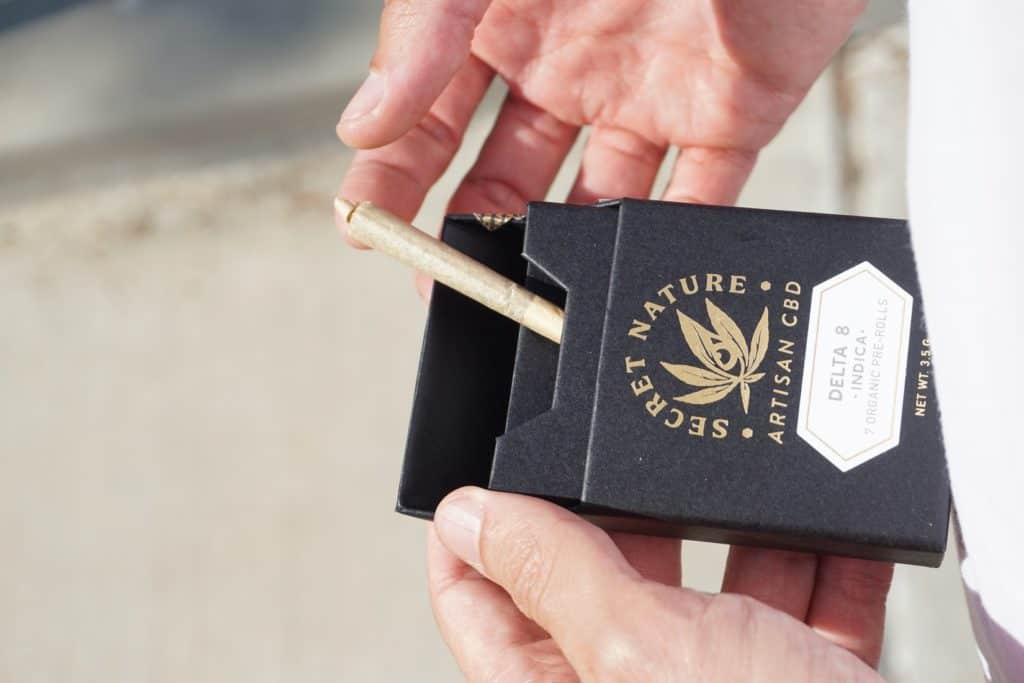
How Is Delta-8 THC Made? What is Delta 8?
Delta-8 is found in small quantities in cannabis and hemp plants. The majority of delta-8 products are made from hemp, which is legal to grow in the US. Generally, processors extract CBD isolate from hemp and then synthesize it into delta-8.
An acid reagent is used to trigger a chemical reaction in the CBD isolate. The extract is then neutralized with an alkaline material. Delta-9 THC is purged from the extract leaving behind a pure delta-8 product.
Delta-8 THC Effects
What is delta 8 like as far as the effects? Similar to delta-9 THC, delta-8 THC can produce euphoric and relaxing effects. Delta-8 THC’s subdued effects can provide mild relief for minor aches and pains. It does not produce an intense high like delta-9 THC. Still, research on delta-8’s effects, benefits, and risks is still in its infancy.
Delta-8 Side Effects
Delta-8 THC’s side effects are similar to delta-9 THC’s side effects. Common side effects include:
- Dry and red eyes
- Dry mouth
- Slow or fast heart rate
- Low blood pressure
- Delayed reaction times
- Confusion
- Anxiety
- Paranoia
- Drowsiness
- Short term memory loss
- Motor control problems
Apart from its common and mild side effects, delta-8’s manufacturing process using hemp-derived CBD may produce harmful byproducts in the final product, especially if it is not tested by an independent lab for purity and potency.
In some cases, untested delta-8 products can contain delta-9 and delta-10 THC compounds. Research on delta-10 THC is also limited. While these THC derivatives may not cause adverse side effects, there still may be harmful byproducts that can be unsafe to consume.
Does Delta-8 THC Produce a High?
Delta-8 THC has a similar but different chemical structure as the highly intoxicating delta-9 THC compound. While delta-8 THC can produce a high, it is much milder than a high from delta-9 THC.
Is Delta 8 THC Legal?
A majority of delta-8 products are made from hemp-derived CBD. The 2018 Farm Bill legalized the production of industrial hemp products. Hemp products with less than 0.3% THC are legal now, but the bill does not address delta-8. As a result, many hemp producers use this loophole to sell delta-8 products across the country.
Delta-8 is now one of the fastest-growing products in the hemp market. Due to the unregulated nature of the market, many in the industry are worried about potential impurities and lack of testing in the production of delta-8 THC. Due to these concerns, many states, including Colorado and New York, have banned the use of Delta-8 THC.
Delta-8 THC vs. Delta-9 THC: What Is the Difference?
Delta-8 THC and delta 9 THC both produce intoxicating effects, although delta-8 THC’s high is much subtler than delta-9 THC’s high. In terms of their chemical structure, both compounds have double bonds and a chain of carbon atoms. Delta-8 THC has its double bonds on the eighth carbon atom, while delta-9 has it on the ninth carbon.
Delta-8 Medical Uses-Benefits of Delta 8
Due to the novelty of the compound and the trace amounts found in cannabis, there is not too much research on delta-8 THC. Much of its medical uses have been anecdotal reports on social media posts, forums, blog posts, and more. What medical uses are delta8 used for?
Users have reported using delta-8 for the following:
- Depression
- Nausea
- Loss of appetite
- Pain
- Insomnia
- Side effects of cancer treatment
The benefits of delta 8 THC, which is sometimes believed to be a compromise between CBD and delta 9 THC, include the following:
It is helpful in alleviating symptoms such as pain, nausea, inflammation, appetite loss, and depression.
When used in lesser dosages, cannabis gives users a high that is calming and energizing, while when taken in higher doses, it can be sedating and provide pain relief.
Even at higher degrees of intoxication, it does not have a tendency to create a loss of control, and it is less likely to cause someone's heart rate to become accelerated.
In a manner analogous to that of Delta 9 THC and CBD, it binds to the CB1 and CB2 receptors, so making a contribution to the control of homeostasis inside the body.
Because of the diminished potency of its effects, it is a more prudent choice for people who wish to steer clear of the anxiety and paranoia that are occasionally brought on by Delta 9 THC.
It is possible that it is more efficient than Delta 9 THC in stimulating appetite, as some research suggest that its effect on appetite could be twice as great.
While delta-8 THC has seemingly worked for many users, the limited research does not fully support these claims. For this reason, we recommend users take caution when buying and using delta-8 products. Many of these products may not be safe to use.
Delta-8 Safety
There is some controversy in the industry surrounding the sale and use of delta-8 THC products such as pre-rolled joints, tinctures, and vapes. Since delta-8 THC production is not regulated properly, the synthetic production of delta-8 THC from hemp can create harmful compounds that can cause adverse side effects.
Delta 8 Trim
Delta-8 trim is a highly concentrated version of the cannabinoid known as delta-8 THC, which originates from hemp plants. Cannabis consumers who are interested in the possible health advantages and psychotropic effects of the substance are driving its growing popularity.
What is Delta-8 Trim?
Delta-8 trim is a highly concentrated version of the cannabinoid known as delta-8 THC, which originates from hemp plants. It is a cannabinoid that is very close to delta-9 tetrahydrocannabinol (THC), which is the primary psychoactive component that may be found in cannabis.
Yet, because Delta-8 THC has a slightly different chemical structure than Delta-9 THC, it produces effects that are somewhat distinguishable from those of Delta-9 THC.
How Is Delta 8 Trim Made?
Delta-8 trim is normally produced by employing specialized equipment and techniques to extract delta-8 THC from hemp plants. This is typically done in order to produce delta-8 trim. During the extraction process, the Delta-8 THC is separated from the several chemical components that can be found in the hemp plant, including CBD and other cannabinoids.
Delta-8 trim is produced after the extraction of the Delta-8 THC, which is followed by the purification and concentration of the THC. The end result is a compound with properties similar to resin that is rich in delta-8 tetrahydrocannabinol (THC).
How is Delta 8 Trim Used?
A wide variety of applications are possible for delta-8 trim. It is also possible to incorporate it into edibles or inhale it in a vape pen. Tinctures, capsules, and topical applications are some of the other Delta-8 THC products that can be made using this ingredient.
When smoked or vaporized, Delta-8 trim creates a smoke that is tasty and smooth, very much like the smoke produced by Delta-9 THC. Delta-8 trim, when infused into edibles, can be utilized to make a broad variety of delectable delicacies, from gummies to brownies, and everything in between.
What Effect Does Delta 8 Trim Have?
The psychoactive high that is produced by Delta-8 trim is comparable to that produced by Delta-9 THC, albeit with mellower effects. It has been discovered to have a number of possible medical benefits, some of which include the alleviation of pain, a reduction in anxiety, and qualities that fight inflammation.
It has also been discovered that delta-8 trim contains qualities that stimulate hunger, which can be good for persons who are through chemotherapy or who are struggling to lose weight.
In What Ways Can Delta 8 Trim Be Used?
Delta-8 shake can be utilized in a variety of settings, all of which are determined by the tastes and requirements of the user. It is possible to incorporate it into edibles for a high that lasts for a longer period of time, or it can be smoked or vaped for quick and immediate benefits.
Other forms of Delta-8 THC products, including as tinctures, capsules, and topicals, can also be made with the help of delta-8 trim.
When using Delta-8 trim, it is essential to begin with a low dosage and gradually build up to the desired level throughout the course of the treatment. This will help to limit the risk of any potential adverse effects and ensuring that the experience is both safe and pleasurable.
Delta-8 trim is an extremely concentrated version of the cannabinoid known as Delta-8 THC, which is generated from hemp plants. Cannabis consumers who are interested in the possible health advantages and psychotropic effects of the substance are driving its growing popularity.
Delta-8 trim has a wide range of applications, including inhalation through smoking or vaping as well as infusion into consumables.
It has been discovered to have a number of possible medical benefits, some of which include the alleviation of pain, a reduction in anxiety, and qualities that fight inflammation.
If you are thinking of taking Delta-8 trim, the best way to guarantee a positive and risk-free experience is to begin with a low dosage and work your way up to the desired level over the course of several doses.
Where Are Delta-8 THC Products Sold?
Delta-8 THC products are available nearly everywhere nowadays from gas stations to convenience stores to dispensaries to online retailers. Customers can buy a wide range of delta-8 products including edibles such as gummies and candies, tinctures, pre-rolled joints, beverages, and vape pens.
Keep in mind, delta-8 products vary in quality. We recommend doing as much research about the producer and their products.
Look up how they source their cannabis or hemp and their processing methods that make delta-8 THC. Always choose products that have been lab tested for harmful substances. Delta8 thc products are being sold all over the US and sometimes by suspect retailers.
Delta 8 Carts
Delta 8 carts, also referred to as Delta-8 THC cartridges, are pre-filled vape cartridges that contain Delta-8 THC oil. Other names for these cartridges include delta 8 carts. These cartridges are gaining popularity among cannabis consumers as a result of the possible positive impacts that they have on one's health as well as their euphoric qualities.
What exactly are Delta 8 Carts?
Vape cartridges that have been pre-filled with Delta-8 THC oil are referred to as Delta 8 carts. Cannabinoid known as Delta-8 THC is structurally related to the psychoactive cannabinoid Delta-9 THC, which is the primary component of cannabis' psychoactive compounds. Yet, because Delta-8 THC has a slightly different chemical structure than Delta-9 THC, it produces effects that are somewhat distinguishable from those of Delta-9 THC.
How are Delta 8 Carts Utilized?
To use a Delta 8 cart, you must first link the cartridge to a vape pen battery that is compatible with the cartridge, and then inhale the vapor that is created by the heating element. Vaping Delta-8 THC is an easy and discrete method of consuming the molecule, and it produces effects that are experienced almost immediately.
Who Manufactures These Delta 8 Carts?
Many different manufacturers in the cannabis sector are capable of producing Delta 8 carts. These businesses range from one-person operations to multinational conglomerates with well-known brand names. When shopping for Delta 8 carts, it is essential to select a company that has a solid reputation and can be relied upon in order to guarantee that the product is both risk-free and of a superior quality.
How Much Does It Cost to Buy a Delta 8 Cart?
The price of Delta 8 cartridges varies significantly based on the brand, level of quality, and capacity of the cartridge. The price of a single Delta 8 cartridge can range anywhere from twenty to sixty dollars.
Delta 8 Carts Include the Following Features
Delta 8 carts come in a number of flavors and strains, giving customers the opportunity to select the product that most closely matches their own preferences and requirements. The majority of Delta 8 carts come equipped with high-quality hardware that improves the overall vaping experience. Some examples of this include ceramic heating elements and glass cartridges.
Advantages of Delta 8 Carts Delta 8 carts provide customers with a number of advantages that they may find useful. The psychoactive effects of Delta-8 THC can produce a calming and euphoric high that is less powerful than the high provided by Delta-9 THC.
Because of this, individuals who are looking for a gentler high may find that Delta-8 THC is a viable option for them. It is also possible that Delta 8 carts have a number of potential medical benefits, including as the ability to alleviate pain, reduce anxiety, and have anti-inflammatory effects.
The high from delta 8 carts is very light and calming, and they also may have significant medical applications. If you are interested in experiencing Delta 8 carts, it is important to select a brand that has a good reputation and can be relied upon in order to have an experience that is both safe and pleasurable.
In recent years, more people have been wondering how long delta 8 remains detectable in their system since delta 8 products offer great therapeutic benefits. It can be a complicated topic, but worth learning more about to avoid any problems.
What is Delta 8 THC?
Delta 8 THC is one of the many components of cannabis. It’s not as psychoactive as delta 9 THC, yet it does produce the high feeling, unlike CBD. It’s also known as delta 8 tetrahydrocannabinol, and concentrated amounts of delta 8 THC come from hemp-derived CBD.
People taking delta 8 usually don’t experience anxiety from it, since it’s not potent and doesn’t have high levels of THC.
The effects of delta 8 include relaxation, feelings of happiness, stress relief, and anxiety reduction. These effects make delta 8 a good treatment for mental health problems like anxiety, depression, and post-traumatic stress disorder.
Also, it’s worth mentioning that delta 8 THC has benefits for physical health as well. It reduces inflammation, pain, nausea and vomiting. People also experience improved quality of sleep after taking delta 8 THC.
How Long Does Delta 8 Remain in The Body?
There are several factors affecting the elimination of delta 8 from the body.
They include:
- Metabolism. It’s the main factor that’s in charge of delta 8 elimination. If you have a fast metabolism, it won’t take long for delta 8 THC to leave your body.
- Body Weight. It’s another factor that plays a huge role, since fat cells can store delta 8 THC. The higher body weight you have, the longer delta 8 THC will retain in your system.
- Dosage. People taking high doses of delta 8 retain the compound in their system for longer, so it’s important to keep the dosage in mind.
- Frequency of Use. Besides the dosage, frequency of use also affects the retention of delta 8 THC. It can take longer for delta 8 to leave the body of a constant user than just a beginner.
- Method of Consumption. There’s a variety of delta 8 THC products, from capsules and edibles to topicals and vape cartridges. The inhalation of delta 8 THC, for instance, provides a faster elimination from the body compared to edibles.
- Certain Medications. It’s not recommended to use delta 8 THC with other medications since they can interact negatively, and they also affect the retention of delta 8 THC in the body.
In some people delta 8 THC can still be detected in the body after 30 days after consumption, and in others, delta 8 isn't detectable after two days. So it’s important to consider the factors mentioned above.
Various drug tests can have different results. For instance, the urine test may not reveal delta 8 after four days, yet the hair follicle test can detect it even three months after the last use. If you’re willing to accelerate that process, you can drink a lot of water and detoxing beverages.
Delta-8 THC is one of the fastest-growing product segments in the cannabis industry. Derived from CBD, this relatively new and minor cannabinoid is becoming a favorite among medical and recreational consumers, especially those that do not have legal access to delta-9 THC.
Understanding the differences between delta-8 THC and CBD can help you have a positive, safe, and legal experience. Here, we will break down how each cannabinoid is produced, its legality, effects, and more to help you choose the suitable chemical compound for your needs.
What Are Cannabinoids?
Cannabis plants contain over 100 cannabinoids, the main chemical compounds that produce a wide range of therapeutic effects.
Generally, research has focused on the two main cannabinoids: delta-9 tetrahydrocannabinol (THC) and cannabidiol (CBD). Minor cannabinoids that naturally occur in the plant include CBN, CBG, CBC, THCV, and delta-8 THC.
CBD and delta-9 THC produce similar therapeutic benefits, including relief from pain, inflammation, nausea, and anxiety. CBD and delta-9 THC have different cerebral effects. Delta-9 THC produces an intoxicating high while CBD is non-intoxicating.
Consuming CBD, THC, and other cannabinoids together may produce an entourage effect that maximizes the therapeutic benefit while minimizing the adverse effects like anxiety and paranoia. More research is needed into the benefits of minor marijuana compounds.
What Is CBD?
Cannabidiolic acid (CBDA) is the second most common chemical compound found in cannabis, although new varieties are bred to produce a higher percentage of CBDA. CBDA is the acidic precursor to its parent compound, CBD. CBDA can convert to CBD when exposed to light and heat.
What Is Delta 8 THC?
Delta-8 THC is a minor cannabinoid in the cannabis plant. Generally, cannabis contains under 1% delta-8 THC, making it difficult and expensive to extract from the cannabis plant.
Delta-8 THC is an analog to delta-9 THC. The only difference between the two cannabinoids is the placement of the double bond on the carbon chain.
Delta-9 THC and CBD can degrade over time and convert to delta-8 THC. Currently, most delta-8 THC products are made from hemp-derived CBD.
Delta-8 THC vs. CBD: What’s the Difference?
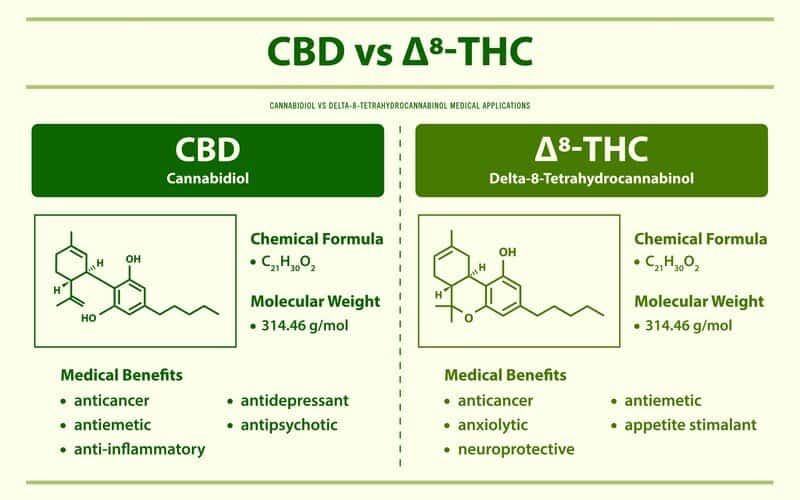
Delta-8 THC and CBD are two therapeutic cannabinoids found in cannabis. While they share many similarities in effects, it is vital to understand the critical differences in their legality, effects, and potency.
Processing
CBD is found in higher concentrations in the hemp plant. Cannabis plants can be bred to contain a higher percentage of CBD. However, most CBD products are made using hemp.
Hemp-derived extracts, topicals, and edibles are made using a CBD concentrate. CBD can be extracted using solvent-based and solventless extraction processes.
Delta-8 THC is usually made with the hemp plant and found in very small concentrations. Using a closed-loop extraction process, processors extract a CBD isolate from the plant material and use a synthetic process to convert the CBD isolate into the delta-8 cannabinoid.
Due to the lack of regulation on delta-8 products, there is a higher risk of products containing contaminants.
Legality
The 2018 Farm Bill legalized the industrial production of hemp plants that contain less than 0.3% delta-9 THC by dry weight. Cannabis products containing a THC percentage over this limit are a Schedule I substance that is federally illegal.
Under federal law, there is no explicit prohibition of delta-8 THC, which is a loophole used by producers and processors to “legally” sell delta-8 THC products in a legal gray area. As a result, many states have moved to restrict or ban delta-8 THC. At the moment, its legal status is unclear.
Delta 8 Effects
In terms of psychoactive effects, delta-8 THC and CBD affect the mind and mental state differently. For example, CBD does not cause an intoxicating effect. Delta-8 THC is known to produce a milder form of intoxication compared to its delta-9 THC analog.
In high doses, delta-8 THC can produce effects of overconsumption, especially for first-time or low-tolerance users.
Both CBD and delta-8 THC have been shown to provide pain relief, anxiety relief, anti-inflammatory effects, and cancer-inhibiting properties. Delta-8 may stimulate appetite, while CBD can suppress appetite.
Delta 8 Side Effects
Most people experience no side effects from CBD, although it can produce mild side effects such as dry mouth, lack of appetite, and sleepiness.
Delta-8 THC’s side effects include fatigue, reduced heart rate, and low blood pressure. Most adverse effects from delta-8 THC reported to poison control centers are due to accidental consumption of edibles.
Delta 8 Drug Testing
Most CBD products that have been lab-tested will not make you fail a drug test. However, when you eat a delta-8 THC edible, the cannabinoid is metabolized in the liver and converted into a THC metabolite detected by a urine drug test.
There is little risk for failing a drug test when delta-8 is inhaled or consumed sublingually or topically.
Delta 8 vs. CBD: Which Cannabinoid Is Right for You?
While delta-8 THC and CBD share many therapeutic benefits, the right cannabinoid for you depends on various factors, including your genetics, tolerance, preferred delivery method, and more.
Why You Would Choose CBD
CBD products can benefit those who do not want to experience intoxicating effects but still want to experience the other therapeutic benefits. A wide range of CBD products are available legally across the country online or in dispensaries.
Why You Would Choose Delta-8 THC
Unlike CBD, delta-8 THC has a mildly intoxicating effect. Users who live in a state that does not offer recreational cannabis use may look towards delta-8 THC for its psychotropic effects. Users should ensure their delta-8 THC products are lab tested and shipped to their state legally.
Delta 8 Laws in the United States
As many states restrict or outright ban delta-8 THC products, the Drug Enforcement Administration (DEA) has announced that Delta-8 THC is federally legal.
While many companies race to ramp up the production of delta-8 products across the country, industry experts warn that there may still be some compliance issues with the production of hemp-derived delta-8. Is delta8 legal? Not always.
DEA Responds to Alabama Board of Pharmacy
On September 15, 2021, the DEA responded to the Alabama Board of Pharmacy regarding the control status of delta-8 THC under the Controlled Substances Act (CSA).
In the letter, the DEA wrote that “cannabinoids extracted from the cannabis plant that have a delta-9 THC concentration of not more than 0.3% on a dry weight basis meet the definition of ‘hemp’ and are not controlled under the CSA.”
At first look, many companies may believe that the DEA is legalizing all hemp-derived delta-8 THC. However, upon closer reading of the letter, the DEA clarifies that delta-8 THC “synthetically produced from non-cannabis materials is controlled under the CSA as a ‘tetrahydrocannabinol.’”
Since delta-8 THC is found in low concentrations in hemp, many producers use a chemical conversion process to convert CBD into delta-8 THC, rendering it a synthetically produced cannabinoid and, therefore, a controlled substance.
DEA Maintains a Consistent Stance on Delta-8 THC
The DEA’s recent announcement on delta-8’s legality echoes a similar statement from a June 2021 virtual town hall hosted by the Florida Department of Agriculture and Consumer Services. DEA Chief of Intergovernmental Affairs Sean Mitchell responded to a question about the legality of delta-8 THC.
Mitchell said, “what I want to say, and I'll be very, very deliberate and clear, at this time—I repeat again, at this time—per the Farm Bill, the only thing that is a controlled substance is delta-9 THC greater than 0.3% based on a dry weight basis.”
States Restrict or Ban Delta-8
In light of unclear federal regulations on delta-8 and other hemp derivatives, many states have taken matters into their own hands. For example, they have passed rules to restrict or ban hemp-derived cannabinoids, including delta-8.
Regardless of how the DEA’s announcement is interpreted, whether you think delta-8 is legal or not, state regulations surrounding this cannabinoid are still in effect. The announcement does not overrule any delta-8 bans.
States began regulating the drug after the hemp-derived products market started to snowball. Currently, 19 states have restricted or banned the drug, with a handful of more states moving in the same direction.
Why All the Controversy on Delta 8 THC?
Delta-8 is naturally found in the cannabis plant, but is only found in very low concentrations. After hemp production became legal due to the 2018 Farm Bill, many companies started growing hemp and producing various derivative products.
Most delta-8 products on the market are chemically processed and not extracted from the plant since it would not be cost-effective. Manufacturers begin with a CBD isolate and use solvents, acids, and reagents to chemically transform CBD into delta-8.
Delta-8 THC’s popularity soared due to its subtle intoxicating effects that have been marketed as entirely legal since they are hemp-derived. However, as delta-8 product availability increased, there has also been an increase in adverse side effects from patients, especially accidental exposures to minors.
Delta-8 products may also contain contaminants that may be harmful for ingestion. Chemicals are commonly used to change the color of the end product and can remain in the solution. Without proper regulation of this loophole, lawmakers and industry insiders worry about consumer health and safety.
Is delta8 thc legal? Not everywhere, any the future is a grey area.
FDA Warns Consumers About Delta-8 Products
In the meantime, the Food and Drug Administration (FDA), tasked with regulating cannabis-derived products, has warned customers about the possible adverse health effects of consuming contaminated delta-8 products.
To understand the cannabinoid better, the agency announced in October 2021 that it would use Reddit and other new data sources to learn more about how CBD and cannabis derivatives like delta-8 are being used.
According to their Cannabis-Derived Products Data Acceleration Plan, the agency “needs robust information about potential safety problems or adverse events associated with FDA regulated products, including [cannabis-derived products].”
The FDA plans to research these data sources for how the products are being used and consumer trends to protect consumers and regulate the relatively new industry.
U.S. Patent and Trademark Office Says Delta-8 Is Illegal
The United States Patent and Trademark Office (USPTO) has taken a firm stance on its trademark policy regarding delta-8 products. So far, about 40 trademark applications for delta-8 products and services have been filed, and only five have been taken up. The USPTO rejected all trademarks and cited the federally illegal status of delta-8.
Delta 8 vs 9
Delta-8 and Delta-9 THC are cannabinoids that are found in cannabis and are closely connected to one another; however, delta-9 is the more well-known and powerful of the two. Both have comparable psychoactive effects, while Delta-8 is less powerful and results in a less intense state of euphoria. The location of a double bond is where the primary distinction can be seen in terms of chemistry: Delta-8 has the double bond located on the 8th carbon atom, whereas Delta-9 has it located on the 9th carbon atom.
When comparing the same quantity of THC to both Delta-9 and Delta-8, there is a discernible difference in the potency of the psychoactive effects produced by each compound due to the minute structural differences between them. In addition, while Delta-9 is the predominant type of THC in marijuana, Delta-8 is more prevalent in hemp and has a more complicated legal status, with some jurisdictions outright prohibiting its use.
Some users are not public about delta8 thc use and they feel they might face judgement.
Is Delta 8 Approved By The FDA?
The FDA does not give its blessing to the use of delta-8 THC. The Food and Drug Administration (FDA) has issued a warning letter to businesses that sell goods containing delta-8 THC, claiming that these products have not been reviewed or approved for safe use in any setting.
The FDA has also received reports of adverse events suffered by persons who have ingested goods containing delta-8 THC, such as hallucinations, vomiting, tremor, anxiety, disorientation, confusion, and loss of consciousness. These adverse events have been reported by people who have taken these products.
One of the psychotropic cannabinoids that can be discovered in the hemp plant is called delta-8 THC. Although it is not as powerful as delta-9 THC, the primary psychoactive component of marijuana, it is nonetheless capable of producing symptoms similar to intoxication. Products containing Delta-8 THC are available for purchase in a variety of formats, such as candies, gummies, and vapes.
Even though the FDA has not yet decided whether or not to regulate delta-8 THC, some states have already prohibited or restricted its sale.
Before purchasing or consuming items containing delta-8 THC, it is essential to research the legal requirements applicable in your state.
If you are thinking about utilizing delta-8 THC, it is essential that you first consult with your primary care physician. It is possible for delta-8 THC to have an adverse interaction with other medications that you are currently taking, and it may not be safe for persons who have particular medical conditions.
Is Delta 8 THC?
Cannabinoids are a class of chemical compounds that are exclusively present in the cannabis plant. Delta-8 THC is a cannabinoid. Delta-9 tetrahydrocannabinol, the primary psychoactive component of marijuana, can be found as this isomer. In comparison to delta-9 THC, delta-8 THC has a lower potency, yet it is still capable of producing intoxicating effects. Yes, Delta 8 is THC.
Because the cannabis plant only contains trace levels of delta-8 THC, the majority of the time it must be synthesized from CBD, a cannabinoid that does not have psychoactive effects and that is found in hemp.
Products containing Delta-8 THC are available for purchase in a variety of formats, such as candies, gummies, and vapes.
Even though the FDA has not yet decided whether or not to regulate delta-8 THC, some states have already prohibited or restricted its sale.
Before purchasing or consuming items containing delta-8 THC, it is essential to research the legal requirements applicable in your state.
Buy Delta 8 Online-What To Look For Before Buying Delta 8
When purchasing Delta 8 THC, it is imperative to verify the THC concentration. A product with a higher THC content is typically more strong and can offer a better overall experience.
But it's important to keep in mind that quality isn't solely determined by THC content. Verifying correct labeling and examining the packaging are essential steps in ensuring that the product you're purchasing is safe and of the highest caliber. So, examine the packaging thoroughly and take your time. You can then go to the following stage after that.
You may verify that the product you've chosen has the required density of Delta-8 concentrate by looking at labeling and independent laboratory test results. A reliable vendor will make this data easily available.
Therefore, be wary of products that make false claims or lack specific details. To use your product safely and effectively, you must confirm its Delta 8 concentration.
Thus far, it appears that you need to carefully review the product information related to your Delta 8 purchase. What other hazards should you be aware of? Certifications for lab testing are an essential component.
“
There are over 300,000 jobs in the cannabis industry. CTU trained me for one of them!

Makes $24.50 @ THC +
You may have confidence in the purity, strength, and consistency of your Delta 8 THC product because it has passed extensive laboratory testing. Customers can feel secure knowing that these lab testing certifications guarantee the highest standards.
Therefore, while looking into Delta 8 THC choices, pay attention to lab testing certifications.
A thorough understanding of the extraction process is necessary while searching for premium Delta 8 THC. Premium goods typically go through a meticulous extraction procedure to provide a pure, superior THC extract.
Always read the information about the extraction procedure before purchasing Delta 8 THC.
Thus, how is Delta 8 produced? Solvents are used in delta 8 extraction to extract the chemical from hemp or cannabis plants. Furthermore, pollutants such as undesired plant materials, herbicides, insecticides, and heavy metals are removed by this process.
Consequently, knowing that Delta 8 has gone through a meticulous extraction procedure allows you to purchase it with confidence.
The source material is another important consideration. The ultimate result can be significantly impacted by the quality of the initial material (cannabis or hemp). Therefore, it's imperative to make sure that the hemp or cannabis utilized to create it is of the highest caliber.
Are the ingredients in your Delta 8 gummies hemp or marijuana farmed organically? Choosing goods derived from premium raw materials can result in a positive Delta 8 THC experience.
It's important to take the time to thoroughly investigate the companies you're choosing as a discerning buyer. Additionally, make sure your selection originated from a reliable source by looking over the offered lab reports.
It's crucial to read reviews and user comments about the Delta 8 products you plan to purchase. These evaluations can provide crucial information about the efficacy, caliber, and safety of a product.
Examine reviews on a variety of platforms, such as social media, forums, and online stores, before making a purchase. Positive customer feedback indicates that a product is safe, dependable, and of high quality, making it worthwhile to purchase.
You may make an investment in a high-quality Delta 8 THC product that has a reputation for satisfying customers if you take the time to conduct your research.
Products containing delta 8 THC are gaining popularity. However, consumers must abide by the laws as they stand. Furthermore, it is imperative to confirm the manufacturer's compliance status with the product.
Begin by verifying if the manufacturer complies with the regulations set forth by the health authorities. Look for information about product certification and testing as well.
Both the US and Canada allow Delta 8. But because to a flaw in the 2018 agriculture bill, it is uncontrolled in the US (federally). At present, the selling of Delta 8 is prohibited in 14 US states. Therefore, before making a purchase, it is advisable to ascertain its legal status.
However, this does not imply that Delta 8 products are untrustworthy. Many producers take the necessary precautions to guarantee that their goods meet safety regulations and don't include any dangerous materials.
If you want even more peace of mind, try to buy from producers in states like Louisiana, Minnesota, or Vermont that control Delta 8.
Purchasing high-end Delta 8 goods online sometimes seem difficult. However, doing so swiftly and securely is feasible. Finding trustworthy vendors who offer high-quality hemp-derived goods that have undergone independent testing is crucial.
Once you've found reliable suppliers, you may easily and securely purchase the ideal item to meet your needs. There's no need to worry about delivery or legality either; if you choose the correct supplier, these things will work themselves out. You may quickly experience the benefits of high-quality Delta 8 items with a little perseverance and investigation.
Become a Master of Marijuana at CTU
Are you interested in learning more about the cannabis sativa plant? Do you want to learn how to grow cannabis plants at home? Enroll in Cannabis Training University’s online marijuana school for a comprehensive insight into the plant’s compounds, how to use cannabis medicinally, and how to start a career or business in this fast-growing industry.
If you want to stay up-to-date with the latest cannabis developments in science, law, and culture, subscribe to the Cannabis Training University’s blog. For a complete cannabis education, enroll in Cannabis Training University.

Fred Hernandez
Fred Hernandez is a highly accomplished and versatile writer, boasting an extensive background in the cannabis industry. With an in-depth understanding of various sectors including cultivators, processors, retailers, and brands, Fred's expertise spans across the entire cannabis landscape. As a prominent contributor to CTU, he consistently delivers insightful articles exploring the latest developments, news, and regulations shaping the cannabis industry. Whether it's delving into the intricacies of cannabis products, cannabis strain reviews, or providing comprehensive analyses of cannabis laws, or sharing expert insights on cannabis cultivation techniques, Fred's wealth of knowledge positions him as an invaluable writer and educator for all cannabis-related subjects.


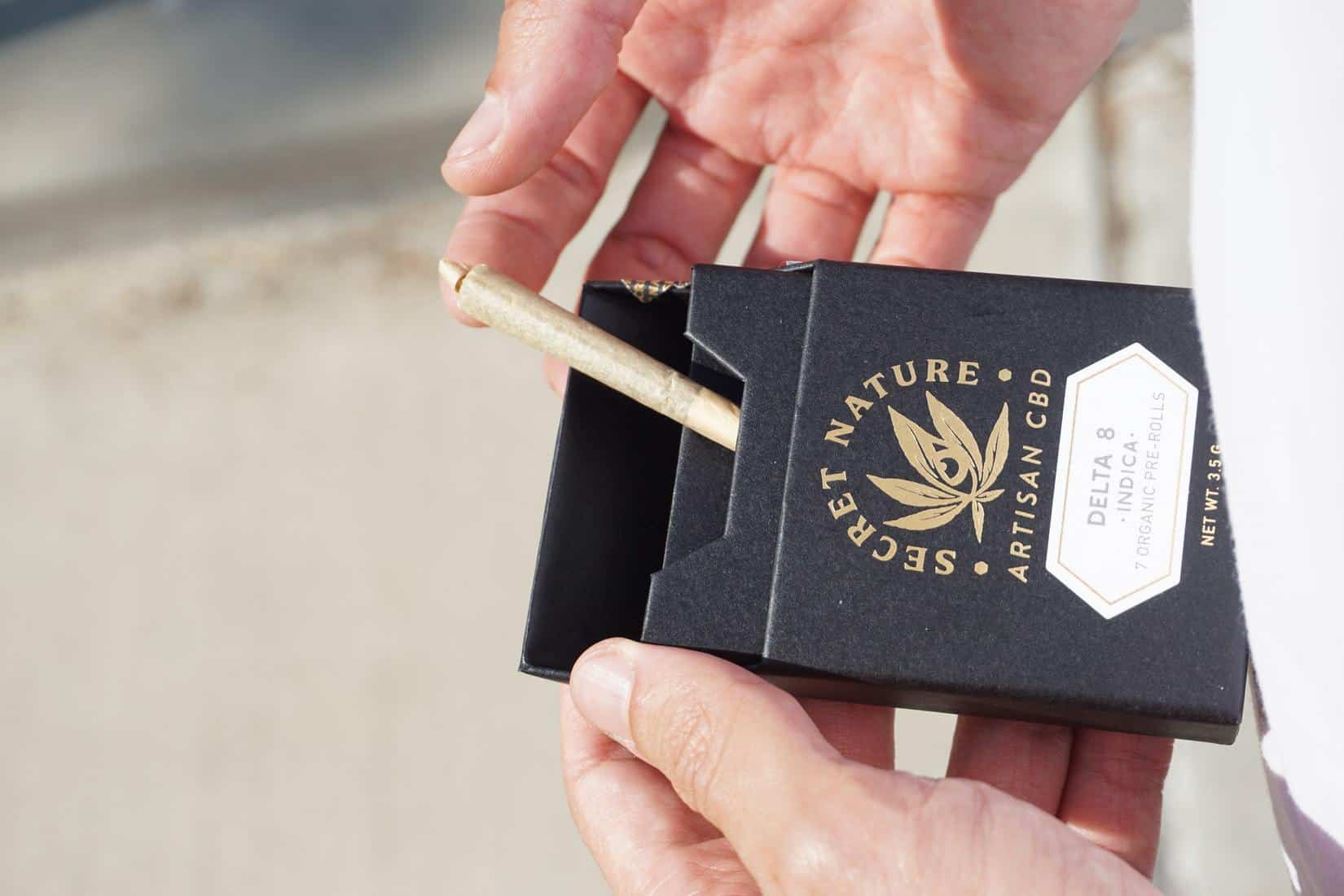



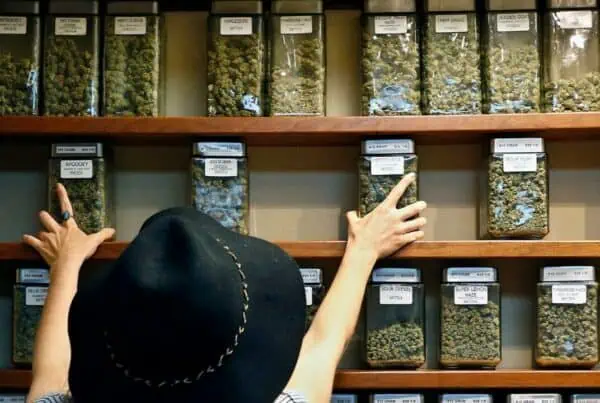
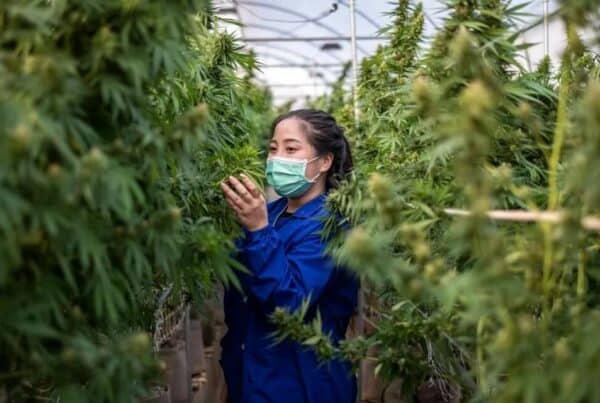
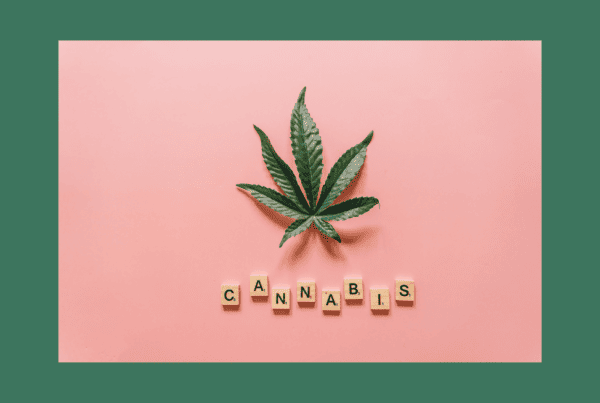

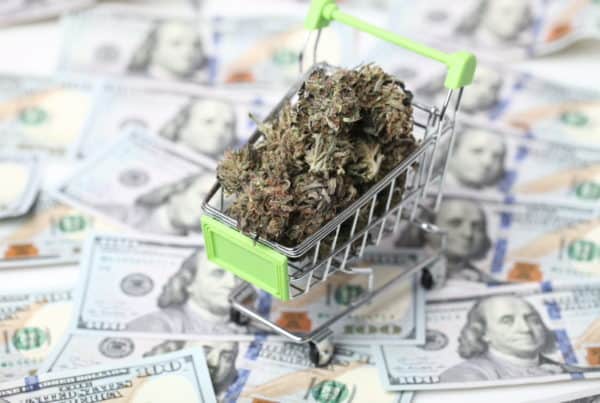

 Jeff was involved in an accident where he endured a traumatic brain injury. He had a week-long stay in ICU where brain surgeons
Jeff was involved in an accident where he endured a traumatic brain injury. He had a week-long stay in ICU where brain surgeons  100% risk free money back guarantee within 48 hours after purchase if student has not completed any of the courses or exams.
100% risk free money back guarantee within 48 hours after purchase if student has not completed any of the courses or exams.